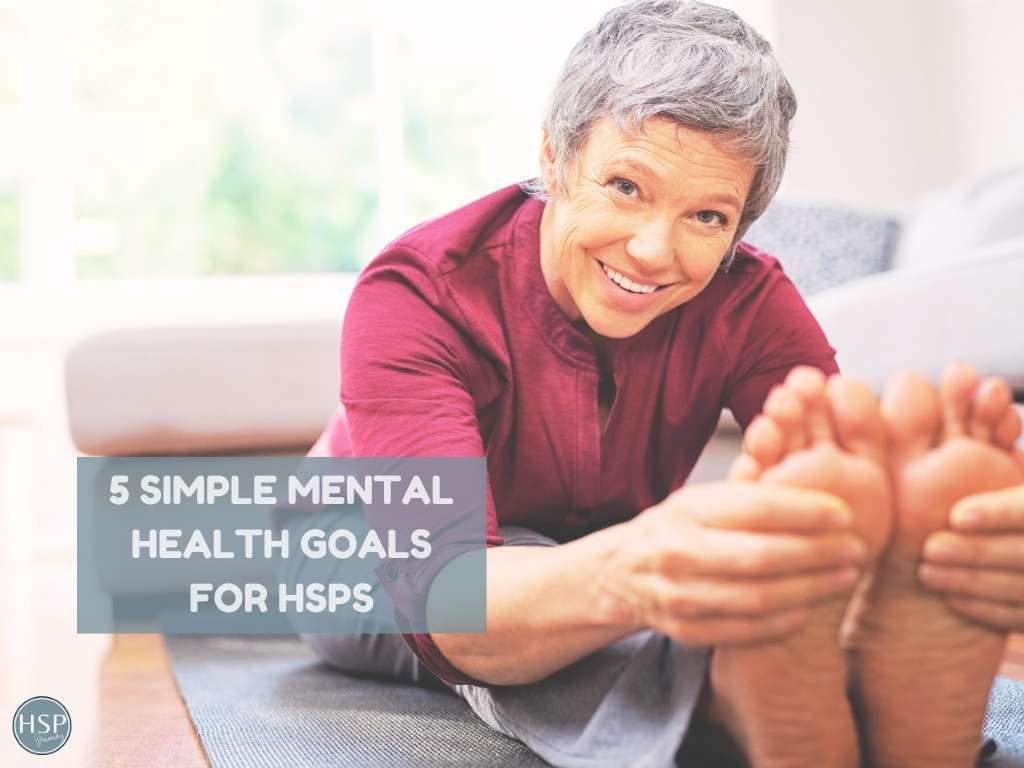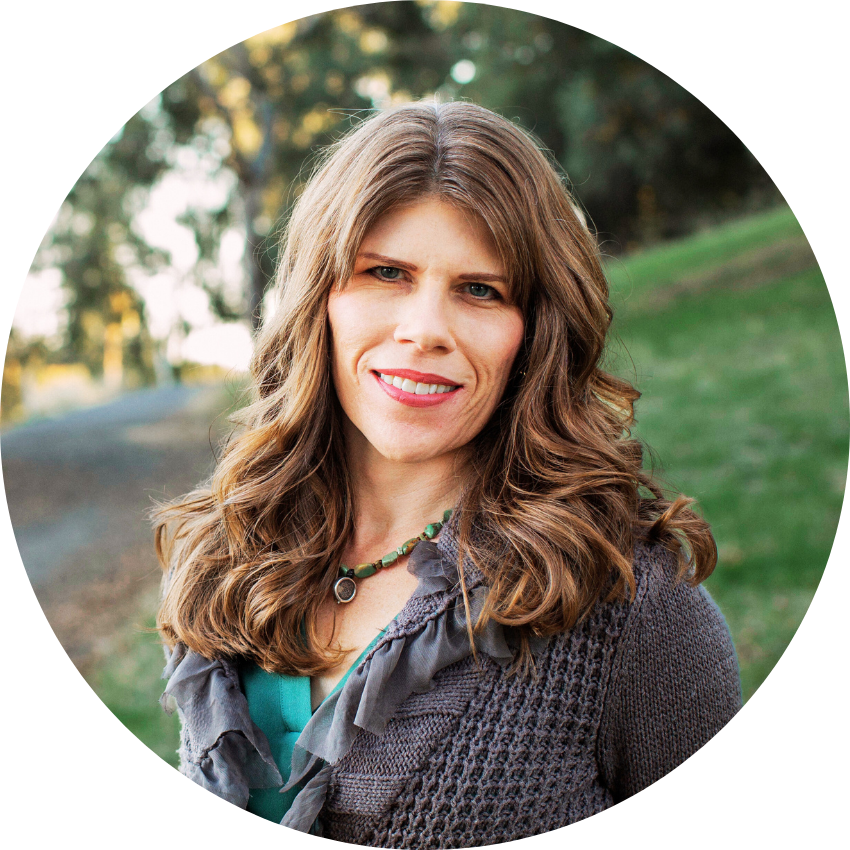As another year begins, thinking about goals related to mental health comes to mind. Why? Because as a highly sensitive person, some of my biggest challenges are issues I face around my mental health. I aspire to be more balanced, to have more patience, and to navigate my days with grace, peace, and joy. But let’s be real, sometimes I’m cranky, irritable, and stuck in my negative thought patterns. So, for the coming year, I decided to set five simple mental health goals for myself.
These mental health goals are near and dear to my heart. As I work through some difficult things in my life, I’m reminded to delve more deeply into each of these five areas to carve out much-needed stability. I’ve also included a bible verse and short meditation on for each of these five mental health goals.

Table of Contents
Mental Health Goal #1 – More Peace
While we think of peace as being a result of something else, setting a goal, or intention, to have more peace feels very much aligned with my mental health goals. You see, I’ve spent quite a few years of my life “giving away my peace.” What do I mean by this? I mean that setting boundaries is a way that we intentionally guard our peace.
We can set boundaries for ourselves such as:
- I will not respond to work calls or texts after 6pm.
- I will not answer unknown phone calls if I don’t recognize the number.
- I will not drink coffee after noon (so that I can sleep at night).
- I will not go to the grocery store on a Saturday because it’s too busy and stresses me out.
- I will not go to the mall on the weekend.
- I will not book too many social engagements back-to-back to preserve my energy.
Do you see what I mean? Setting small, manageable boundaries for ourselves related to our physical health, our mental health, and our work can go a long way to preserve our peace. Each person is different. I encourage you to think through when you start to feel angry, irritated, or frustrated. Then back up a bit, notice the things that happened just prior to getting angry. Did you break one of your boundaries unintentionally (or intentionally)? Often, the boundary break is one of the reasons we are upset.
I urge you, set reasonable and doable boundaries to protect your peace.
For those open to the faith element of peace, I share with you this impactful verse, spoken by Jesus Christ:
“Peace I leave with you; my peace I give you. I do not give to you as the world gives. Do not let your hearts be troubled and do not be afraid.” John 14:27 NIV
Meditation: Think of a flowing river. You are sitting safely in a camping chair with a cozy blanket over you by this river. You see the water flowing over the rocks, making a peaceful gurgling sound. Close your eyes and imagine sitting by this river. Feel the peace.
Mental Health Goal #2 – More Rest
I’ve written about downtime, which is rest, but not sleep. Rest, downtime, and sleep are all equally important and linked to better health. I’m lumping these together because carving out downtime and rest to find rejuvenation are vital to feeling less stressed and more whole. Getting enough sleep for your body can provide incredible mental (and physical) health benefits. Adopting a lifestyle that allows for you to prioritize rest can be tough for some professionals; however, with time and precision, many people can shape their careers around their need for rest. I highly recommend aiming to do this, especially if you’re at or above middle age (40+).
Many of us live weary, exhausting lives going from one meeting to the next. HSPs are typically miserable living like this, so if your life is full of stress and lacks enough downtime, rest, or sleep, I encourage you this year to prioritize resting and taking time for yourself as much as possible.
For those open to the spiritual element of rest, I share with you this impactful verse, spoken by Jesus Christ:
“Come to me, all you who are weary and burdened, and I will give you rest.” Mark 11:28
Meditation: Lay down on the floor or your bed. Close you eyes. Ask Jesus to come lie next to you and rest beside you. Align yourself with the strength of Christ during inaction. He is with you. He rests with you.
Mental Health Goal #3 – More Calm
When I think about being calm, it seems like the opposite of being anxious. Sometimes anxiety hits us and we feel out of control, especially if we have a diagnosed disorder. For those without a disorder, there are small ways to add more calmness into your life, little by little.
Here are some suggestions for adding more calm to your life:
- Play soft, relaxing music through a speaker, headphones, or earbuds while you work. Some suggestions are EMDR music, light classical, light jazz, movie soundtracks, instrumental hymns, peaceful piano, or chill guitar. These types of Spotify stations are my “go-to” to bring a sense of calm and peace to my work hours, exercise time, and drive time.
- Enjoy hot (or cold) beverages throughout the day. Drinking water is a must, but add in several cups of your favorite tea or coffee, sparkling water, or home brewed ice tea.
- Take five minute stretching breaks throughout the day.
- Take a least one 20-minute walk outside to enjoy nature and reset.
- When stress creeps in, remember to breathe. Box breathing or other helpful breathing techniques can lower your blood pressure and remind yourself that calm is your permanent setting.
For those open to a faith approach, embrace a sense of calm that comes through relying on God to guide your day:
“But I have calmed and quieted myself,
I am like a weaned child with its mother;
like a weaned child I am content.” Psalm 131:2Meditation: Recall a time when you held a small baby in your arms. Think of how your physical presence was enough to calm the baby and put them to sleep. Now, close your eyes. Cross your arms and gently alternate squeezing your own shoulders one at a time for 30 seconds. Say to yourself, “I am calm and at peace.” Repeat if needed.

Mental Health Goal #4 – More Joy
In a resent movement therapy group I participated in, the instructor offered us a new reframing idea when struggling with depression. She called it, “counter-depression” (instead of anti-depression, as the class of medications for depression are called). To counter depression is to invite more joy into your life. We HSPs have a leg up in that we notice the small, beautiful things of this world more than the average person. I can simply look out my window as I write this article and see a small bird alighting on the tree in my front yard. I take a moment to notice this bird and to feel a sense of joy and wonder in creation.
I offer you this simple joy-hacks to include in your life as-needed:
- Change the position, room, or location in which you work daily, if possible. If you normally read or meditate in the morning, switch things up and sit outside with a blanket on your lap. Invite joy to come in the morning.
- Take your laptop to a nice park and use your phone’s hot spot internet features to work from a shady spot while surrounded by kids playing, birds singing, or people playing ball with their dogs. Joy will follow.
- Take a walk around your neighborhood with a trash bag in hand. Pick up small pieces of trash. Notice the sidewalks and bushes. Thank the yard crews clipping the grass. Say hello to your neighbors. There is joy in caring for your community.
Enjoy the small things; be grateful and make lists when things work out (to remind yourself when things don’t work out).
For those open to including faith in their lives, expand your hearts to include a sense of awe, wonder, and joy that come from knowing that universe is filled with opportunities for adding in more daily joy:
“Dear brothers and sisters, when troubles of any kind come your way, consider it an opportunity for great joy. For you know that when your faith is tested, your endurance has a chance to grow.” James 1:2-3
Meditation: Sit outside on your porch, on a park bench, or in your backyard. Make a list in your journal or on your phone for all the beauty of nature that inspires you as you look around. Record simple things that give you joy such as squirrels, birds, bugs, leaves, flowers, dogs, or even neighbors who walk by.

Looking for an HSP-Trained coach to help you align your life with your priorities?
Through my Highly Sensitive Person (HSP) certification with the Nickerson Institute, as well as being an HSP, I offer HSP coaching to develop specific goals around your HSP needs. We HSPs frequently deal with anxiety and overstimulated nervous systems that prevent us from achieving peace and attaining our life goals. HSP coaching with me includes a detailed review of your sensitivities and a mutually-desired plan for growth and management of this superpower to shift negativity and begin seeing yourself as the hero of your own story. (Affordable monthly coaching begins at $150/month.)
Mental Health Goal #5 – More Pace
Avoid rushing, overdoing, and over-committing, knowing that it is hard to do. Many HSPs struggle with having too many activities, projects, events, or presentations all clumped together. I recently experienced this when I had a last minute music gig book less than 24 hours before the event while my two college kids were home for the weekend. I had also volunteered to play piano and sing on our church’s worship team Sunday, plus a potluck lunch with friends after church and a concert in the evening. Sometimes things just fall wildly all in one short timeframe and you roll with it; most of the time, aim for a sprinkling of events and not a flood in order to protect your energy.
- Rush less. Where possible, build in an extra five minute buffer before your next meeting or appointment. Give yourself the gift of calm by arriving slightly early (2-5 minutes is enough).
- Review your calendar on Sunday night and see how many appointments, meetings, calls, lunch dates, and other types of events you have each day. Think through where you can batch several things together to give yourself an afternoon for deep work.
- At the end of each week, review how your week went – did you have too much happening? Or not enough? Look for balance and pace in your days. Make a note of things that worked or didn’t work. Adjust accordingly for the coming week.
For those willing in allowing God to shape your schedule to release control and trust more, consider this poetic reworking of Psalm 23:
“The Lord is my pacesetter, I shall not rush. He makes me stop and rest for quiet intervals. He provides me with images of stillness which restore my serenity.” Psalm 23:1-2, reworking by by the Japanese poet, Toki Miyashina
Meditation: Close your eyes and imagine yourself running. As you run, you feel the warmth of the sun on your face. You aren’t striving, you’re running with ease at a doable pace. Feel God’s hand on your shoulder slowing you down as you pass by a beautiful stream. He allows you to rest by this lovely stream, listening for stillness and serenity. Feel the safety and peace.
Be sensitive, be free
*This post contains affiliate links and I will be compensated if you make a purchase after clicking on my links*





[…] Regular exercise helps highly sensitive bodies discharge the stress they’re carrying, along with having proven benefits for both mental and physical health. […]